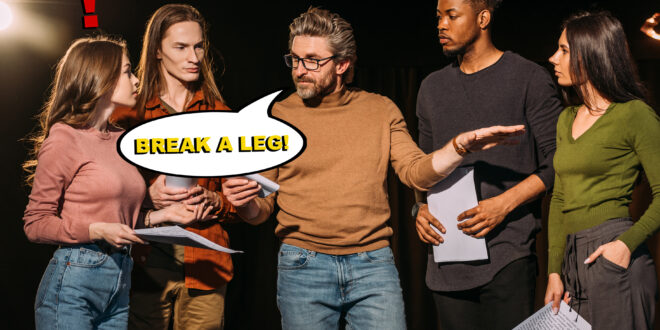Were you ever in drama class and someone told you to break a leg, and you thought are they a Karen? Well, they actually were wishing you luck. Let’s break down 10 of the most famous sayings that originated from the world of theater. We look at various origins, interpretations, and impact these sayings have had on our culture, from Shakespeare to modern musicals. Here you’ll find a delightful and fascinating exploration of ten of the most evocative theatrical quotations.
1. Break a leg
The phrase “break a leg” is believed to have originated in the theater world, and is a superstitious phrase used by actors before going on stage. The phrase is thought to have originated with the belief that wishing someone bad luck would ensure they would receive good luck, as all the superstition around them would bring them success. It is also thought to have originated from the idea that if one was able to break a leg while on stage, it would bring them good luck. The phrase is still widely used today and is embraced by theater professionals as a way of wishing each other luck and good fortune.
2. Upstage
The term “upstage” refers to the area at the back of a theater stage. Actors who are performing upstage will usually be further away from the audience and out of their sightline. This is contrasted with the area downstage, which is closer to the audience and therefore in full view. When an actor moves upstage, they are moving further away from the audience. Upstaging can be used to create dramatic effects or to redirect the audience’s attention to a different part of the stage.
3. Bravo
The term “bravo” is believed to have originated from the Italian word “brava”, which means “good woman”. The term is used as a way of praising a performance, usually by an actor or act. It is thought to date back to the 16th century, when it was often used in theatrical performances and opera houses to show appreciation for a particularly good performance. Today, the term is still widely used to express approval, admiration, and celebration.
4. Brava
The term “brava” is believed to have originated from the Italian word “brava”, meaning “good woman”. It was traditionally used in Italian opera houses as a way of praising a particular performance, usually by an actress or female singer. The phrase quickly spread across Europe and eventually became the more widely recognized term “bravo”, which is used today as a way of expressing admiration and approval.
5. Don’t say Mcbeth
The phrase “Don’t say Macbeth” is believed to have originated from the superstition surrounding William Shakespeare’s play Macbeth. As the story goes, saying the play’s title out loud within a theater is said to bring bad luck upon the production and its actors. The superstition is rooted in the idea that Macbeth is cursed and uttering its name would invoke its wrath. To this day, many actors still adhere to the superstition and will not say the play’s title within a theater.
6. That Was a Showstopper
The phrase “showstopper” is believed to have originated in the theater. It is used to refer to a performance that is so impressive, it stops the show and brings the audience to their feet in applause. The phrase is thought to date back to the early 19th century, when opera houses were held in high regard by upper-class audiences. An exceptional performance by one of the lead singers would be met with such enthusiasm that it was said to have “stopped the show”. To this day, the phrase is still used to describe a performance that is truly extraordinary.
7. In the Limelight
The phrase “in the limelight” is believed to have originated from the theater. It is used to refer to a performer or actor that is receiving a great deal of attention, usually from the audience or the press. The phrase is thought to date back to the early 19th century, when theaters began using limelight to illuminate their stages. Performers who were in the spotlight (literally and figuratively) were said to be “in the limelight”. Today, the phrase is still used to describe someone who is receiving a great deal of attention or recognition.
8. Wing It
The phrase “wing it” is believed to have originated in the theater. It is used to refer to an actor or performer who is improvising their performance, usually due to a mistake or lack of preparation. The phrase is thought to date back to the early 20th century, when actors would often have to improvise their lines after forgetting them. To “wing it” meant to trust one’s own instincts and try to “fly by the seat of your pants” without a script or safety net. Today, the phrase is still used to describe someone who is doing something without any prior preparation or planning.
9. House
The term “house” is used in theater to refer to the audience. It is derived from the idea of a theater or performance space being similar to a house, where the “guests” have come to be entertained. The term is also used to describe the collective mood or energy of the audience. For example, if the audience is enthusiastic and engaged, the theater might be said to be “packed to the rafters” or “in full house”.
10. Strike
In theater, striking is the activity of removing items from a performance space after a production has finished either running or rehearsing. This involves removing props, costumes, set pieces, and other equipment used during the show.
Have you heard of a saying in theatre that you think we should add to the list? Let Crazy Nate know on twitter and maybe we will add it to the list.
 Crazy Nate Share a smile!
Crazy Nate Share a smile!










